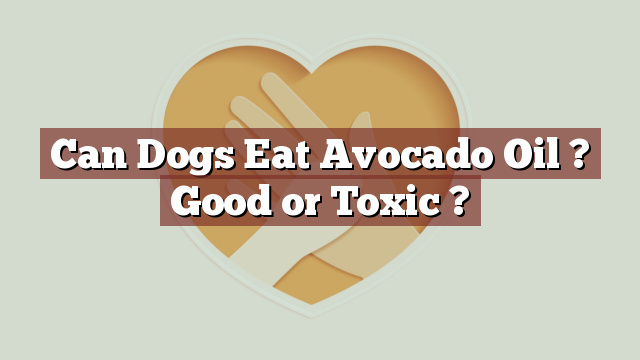Can Dogs Eat Avocado Oil? Good or Toxic?
Knowing which foods are safe for our pets is crucial in ensuring their overall well-being. As responsible pet owners, it is important to be aware of the potential risks and benefits associated with various food items. In this article, we will explore whether dogs can safely consume avocado oil and evaluate its nutritional value for our beloved canine companions.
Nutritional Value of Avocado Oil: What Does it Contain?
Avocado oil is derived from the fruit of the avocado tree and has gained popularity in recent years due to its numerous health benefits for humans. It is rich in monounsaturated fats, which are considered beneficial for heart health. Avocado oil also contains vitamin E, vitamin K, and antioxidants that may offer protection against inflammation and oxidative stress.
Can Dogs Eat Avocado Oil? Is it Safe or Toxic for Dogs?
Can dogs eat avocado oil? The answer is yes, in moderation. Avocado oil itself is generally safe for dogs to consume. However, it is important to note that the flesh, pit, and skin of avocados contain a substance called persin, which is toxic to dogs and many other animals. Thankfully, avocado oil is typically processed in a way that removes persin, making it safe for canine consumption.
While the oil is safe, it is crucial to avoid feeding dogs whole avocados or any avocado products that contain the flesh, pit, or skin. These parts of the fruit can cause gastrointestinal upset, including vomiting and diarrhea, and in severe cases, they may even lead to pancreatitis. Therefore, it is important to only provide dogs with avocado oil that is specifically manufactured for human consumption.
Potential Risks or Benefits of Dogs Consuming Avocado Oil
The consumption of avocado oil by dogs can provide potential health benefits. The monounsaturated fats in avocado oil may promote a healthy coat and skin for our furry friends. Additionally, the presence of antioxidants and vitamin E in avocado oil might offer immune system support and assist in reducing inflammation.
However, it is important to note that avocado oil is high in fat content. Excessive consumption can lead to weight gain and potentially contribute to obesity-related health issues in dogs. Therefore, moderation is key when incorporating avocado oil into their diet.
My Dog Ate Avocado Oil: What Should I Do?
If your dog accidentally consumes a small amount of avocado oil, there is generally no need to panic. However, it is always advisable to monitor your dog for any signs of digestive distress such as vomiting or diarrhea. In such cases, it is best to consult with a veterinarian to ensure the well-being of your pet.
In the event that your dog ingests a significant amount of avocado oil or shows severe symptoms, it is crucial to seek immediate veterinary assistance. The veterinarian will be able to assess the situation and provide appropriate guidance or treatment.
Conclusion: Moderation is Key in Feeding Dogs Avocado Oil
In conclusion, dogs can eat avocado oil as long as it is provided in moderation, and the flesh, pit, and skin of avocados are strictly avoided. Avocado oil can offer certain health benefits for dogs, including a healthy coat and skin, immune system support, and potential anti-inflammatory effects. However, it is essential to remember that excessive consumption can have negative consequences, such as weight gain and obesity-related issues. As responsible pet owners, it is always advisable to consult with a veterinarian before introducing any new food items into your dog’s diet. By doing so, we can ensure that our furry companions stay healthy and happy for years to come.
Thank you for investing your time in exploring [page_title] on Can-Eat.org. Our goal is to provide readers like you with thorough and reliable information about various dietary topics. Each article, including [page_title], stems from diligent research and a passion for understanding the nuances of our food choices. We believe that knowledge is a vital step towards making informed and healthy decisions. However, while "[page_title]" sheds light on its specific topic, it's crucial to remember that everyone's body reacts differently to foods and dietary changes. What might be beneficial for one person could have different effects on another. Before you consider integrating suggestions or insights from "[page_title]" into your diet, it's always wise to consult with a nutritionist or healthcare professional. Their specialized knowledge ensures that you're making choices best suited to your individual health needs. As you navigate [page_title], be mindful of potential allergies, intolerances, or unique dietary requirements you may have. No singular article can capture the vast diversity of human health, and individualized guidance is invaluable. The content provided in [page_title] serves as a general guide. It is not, by any means, a substitute for personalized medical or nutritional advice. Your health should always be the top priority, and professional guidance is the best path forward. In your journey towards a balanced and nutritious lifestyle, we hope that [page_title] serves as a helpful stepping stone. Remember, informed decisions lead to healthier outcomes. Thank you for trusting Can-Eat.org. Continue exploring, learning, and prioritizing your health. Cheers to a well-informed and healthier future!

